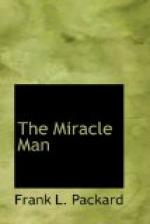He reached the cottage door, and, lifting the brass knocker that shone dimly in the darkness, knocked once, lifted it to knock again—and his hand fell away as he smiled a little foolishly.
“I forgot the Patriarch was deaf,” he muttered. “Wonder what you’re supposed to do? Walk right in, or—”
The door swung suddenly wide open, and upon Madison’s face, usually so perfectly at its owner’s control, came a look of stunned surprise. The Patriarch was standing on the threshold, and, with a gesture of welcome, was motioning him to enter.
—V—
A STRANGE CONVERSATION
Madison, quite in command of himself again in an instant, stepped, smiling, into the cottage. He took the Patriarch’s extended hand in a cordial grip and nodded understandingly as the other, with quick, rapid motions, touched lips and ears to signify that he could neither hear nor speak. But, inwardly puzzled, Madison searched the Patriarch’s face—was the other playing a part? Could he hear, after all—and perhaps speak as well, if he wanted to! There was certainly no guile in the venerable, gentle face—or was it guile of a very high order?
The Patriarch closed the door, and drawing his own armchair to the table offered it to Madison with a courteous smile.
Madison refused by gently forcing the old man into it himself, pulled another up to face the Patriarch, sat down—and his eyes fixed suddenly on the ceiling above his head. Swaying slowly back and forth was a sort of miniature punkah of waving white canvas. He studied this for a moment, then his eyes shifted to the Patriarch, who was regarding him humorously.
The Patriarch rose from his chair, walked to the door, opened it, moved the knocker up and down—and pointed to the ceiling. The canvas was waving violently now, and Madison traced the cord attachment, on little pulleys, across the ceiling to where it ran through the door and was affixed to the knocker without. It was very simple, even primitive—every time the knocker was lifted the cord was pulled and the canvas waved back and forth. Madison nodded his head and smiled approvingly, as the Patriarch once more closed the door and resumed his seat.
Madison leaned back in his chair and allowed his eyes to stray, not impertinently but with pleased endorsement, around the room, to permit an unhampered opportunity for the scrutiny of the blue eyes which he felt upon him.
“And to think,” he mused reproachfully, “that I could have doubted him for a single instant—he certainly hung one on me that time.”
The Patriarch reached into the drawer of the table beside him, took out a slate and pencil, scratched a few words on the slate and handed both pencil and slate to Madison.
“Your name is Madison, isn’t it?” Madison read. “From New York? Hiram told me about you.”
“Hiram,” said Madison to himself, “is a man of many parts, and the most useful man I have ever known. Hiram, by reflected glory, will some day become famous.” On the slate he replied: “Yes; that is my name—John Madison. It was good of Mr. Higgins to speak of me.”




